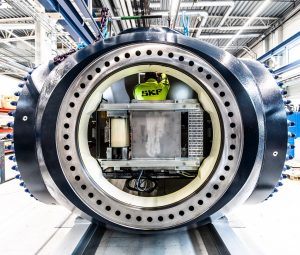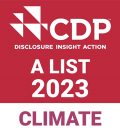Emissions reduction targets of SKF approved by SBTi

The Science Based Target initiative (SBTi) has verified SKF’s net-zero target by 2050, validating both SKF’s near and long-term science-based emissions reduction targets.
As the global body enabling companies and financial institutions to set ambitious emissions reductions targets in line with the latest climate science, SBTi validation means that SKF’s targets comply with their criteria and that targets are in line with both climate science and the goals of the Paris Agreement.
SKF has committed to reducing its absolute scope 1 and 2 GHG emissions by 95% by 2030 from a 2019 base year and to reduce its scope 3 emissions by at least 31% by 2030. In addition, SKF has committed to reach net-zero GHG emissions across the value chain by 2050. This includes a commitment to maintain at least 95% absolute reduction of scope 1 and 2 GHG emissions from 2030 to 2050 from a 2019 base year. Furthermore, SKF commits to a reduction in absolute scope 3 GHG emissions from purchased goods and services, fuel and energy related activities, upstream transportation and distribution and use of sold products 90% by 2050 from a 2019 base year. SKF also commits to neutralising any residual emissions in its value chain to reach net-zero by 2050.
Magnus Rosén, head of Sustainability at SKF, said: “Validation from the SBTi is of great importance to SKF and increases accountability and credibility of our climate action through their monitoring, reporting and verification framework. We have set a clear and bold path to reach net-zero emissions in 2050. Our targets are based on an understanding of the complete life cycle, meaning we will prioritise actions that make the biggest positive impact, while avoiding negative trade-offs”.
 “Science-based sustainability targets are critical in guiding businesses towards a future that is both economically prosperous and environmentally sustainable – said Rickard Gustafson, president and CEO at SKF -. By setting targets that align with the latest scientific research, we can help mitigate climate change, protect natural resources, and create a better future for all. At SKF we are determined to not only do our part in this transition, but also help our customers in their sustainability journeys, and thereby enabling as much impact and pace as possible”.
“Science-based sustainability targets are critical in guiding businesses towards a future that is both economically prosperous and environmentally sustainable – said Rickard Gustafson, president and CEO at SKF -. By setting targets that align with the latest scientific research, we can help mitigate climate change, protect natural resources, and create a better future for all. At SKF we are determined to not only do our part in this transition, but also help our customers in their sustainability journeys, and thereby enabling as much impact and pace as possible”.
The SBTi is a collaboration between CDP, the United Nations Global Compact, World Resources Institute (WRI) and the World Wide Fund for Nature (WWF) and one of the We Mean Business Coalition commitments. The SBTi defines and promotes best practice in science-based target setting, offers resources and guidance to reduce barriers to adoption, and independently assesses and approves companies’ targets.
More information about SKF’s approach of reducing GHG emissions and progress to date is available here.
Contenuti correlati
-
Transparency on climate change, SKF recognized with ‘A’ score from CDP
SKF has received an ‘A’, the top Climate Change rating available from CDP, the global non-profit that runs the world’s largest climate and environmental disclosure system for companies, cities, states and regions. Based on data reported to...
-
Platinum medal in sustainability to SKF from EcoVadis
SKF has achieved a Platinum Medal from EcoVadis, one of the world’s most trusted providers of sustainable ratings for use in supply chains. This is the third year SKF has been awarded the Platinum medal and now...
-
Shaping the Future 2030 vision announced by Omron
Omron has announced its new long-term vision for fiscal 2030 and a three-year medium-term management plan, with the objective to strengthen the pace and extent of worldwide sustainable development. The vision strives to solve more diverse social...
-
Emission reduction targets SBTi science-based for Atlas Copco
Starting with 2022, the emission reduction targets of Atlas Copco will be validated by the Science Based Target Initiative (SBTi), an initiative created by CDP (the United Nations Global Compact), by WRI (World Resources Institute) and the...
-
Schaeffler Group to be climate neutral by 2040
The Schaeffler Group announced it will be operating as climate-neutral company from 2040. This objective covers the entire supply chain and is underpinned by ambitious mid-term sustainability targets. The Schaeffler Group is therefore accelerating the pace of...
-
Renewables and materials cycle in Ensinger’s climate strategy
Renewables and recycling of materials are key elements of Ensinger’s climate strategy, aimed to reduce and gradually eliminate the company’s greenhouse gas (GHG) emissions coming from the operations of the high performance plastics processor. As its first...














